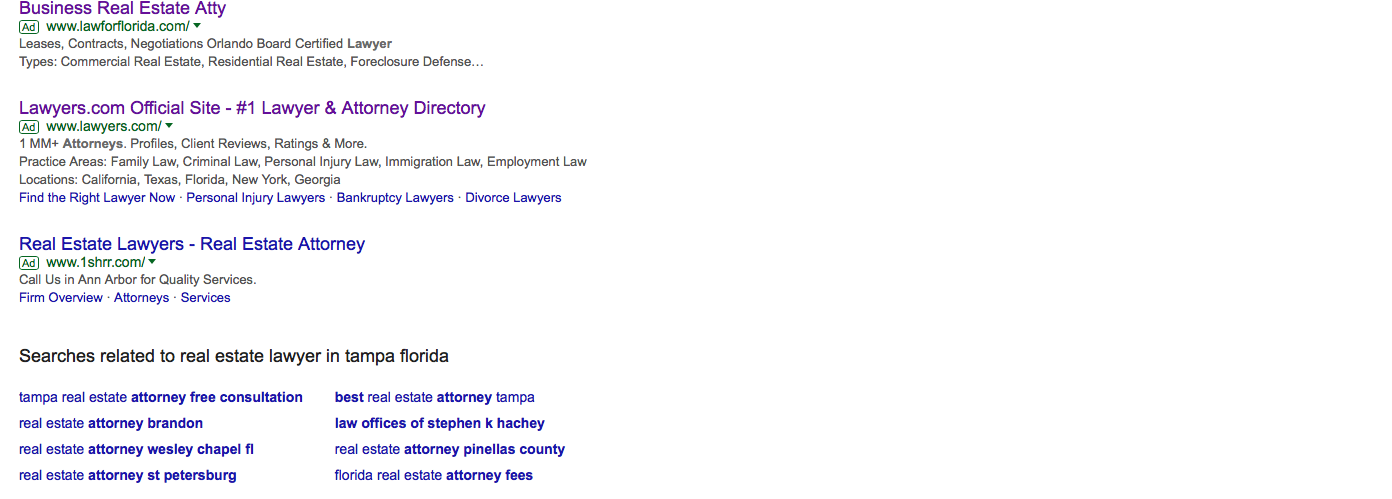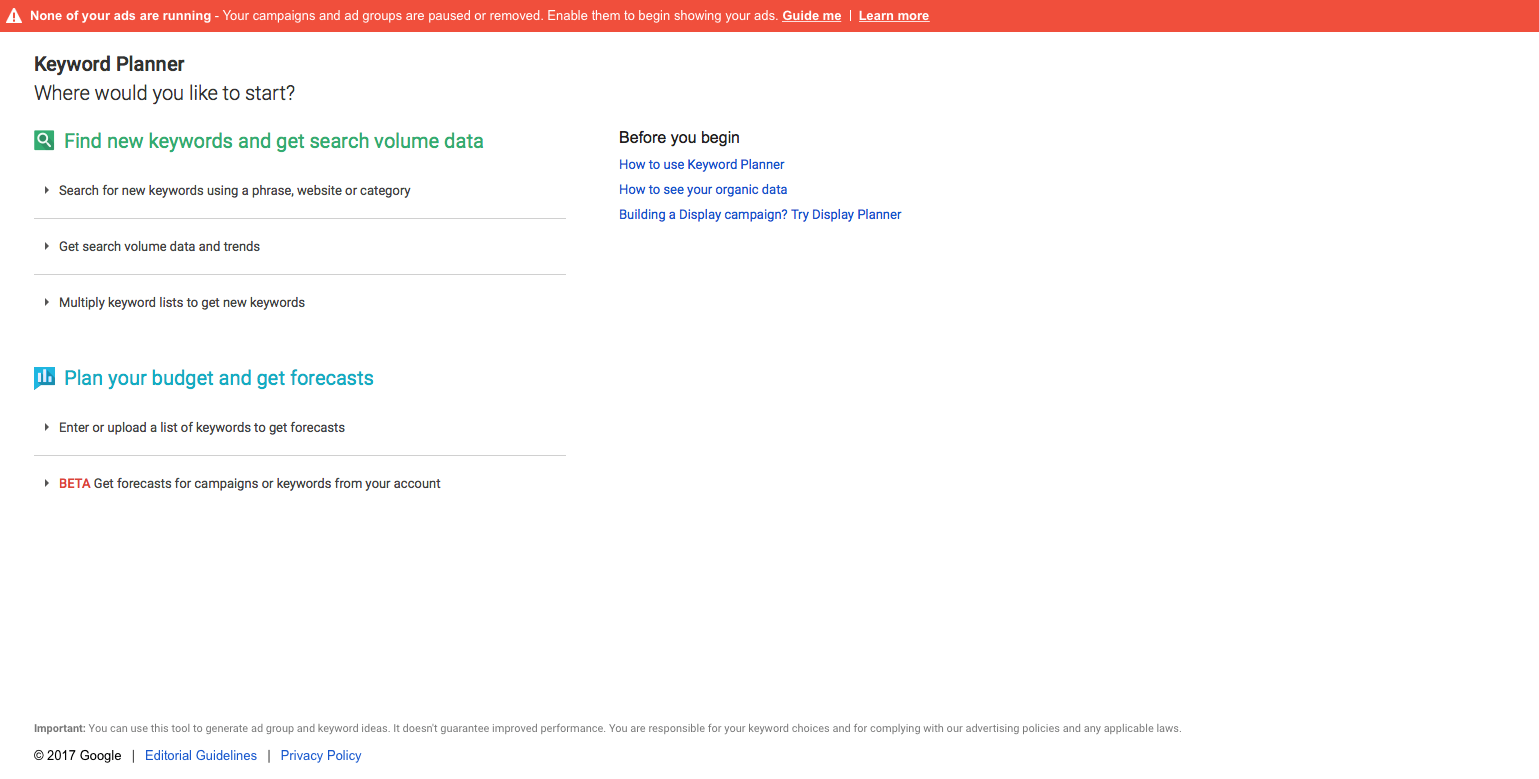~Introduction~
This article is designed for the real estate attorney possibly looking to advertise his or her services online, but with little or no knowledge of the advertising behemoth, Google Adwords, what it is, what it does, and how it works.
By the end of this article, you will have a basic understanding of Adwords and how you might use it to get new clients. Of course, you’ll want to check your state ethics rules before starting an ad campaign.
What is Google Adwords?
Not so long ago, a real estate attorney looking to gain clients might have placed an advertisement in the local Yellow Pages. That option is still available, but so is Google Adwords Google Adwords is a global online advertising platform. It can be used to advertise virtually anything, from products such as duct tape, to services such as legal and accounting services, to charitable and political campaign fundraising. For the real estate attorney, a carefully constructed Adwords campaign, properly targeted to the right audience, with the right message, can draw quality clients.
How does it work?
Google sells advertising space on several of its properties, including Maps, Gmail, YouTube, and Search. For this article, we will focus on advertising in the Search property.
Look at the screenshot below.
The search results with the small “ad” in a box below the headline are Google Adword advertisements.
Google gets paid every time someone clicks on the link. And that’s good news for Google, which has generated billions of dollars in revenue as a result.
The good news for the advertiser is that she is responding to an intentional request for the information, which is unlike traditional advertising (Yellow Pages, radio, television, and newspapers), where the advertiser spreads the message to everyone, in the hope that someone seeing or hearing the pitch will be interested in what the advertiser is selling.
With Adwords, the prospect is actually looking for your message, so they are pre-qualified leads, if you will. All the advertiser needs to do, but this is vitally important, is to match her message with what the searcher is looking for, in a way that compels her to open the link and keep reading.
When the two are lined up, magic happens. When they are not, nothing happens, except the advertiser has wasted time, and advertising dollars, which can quickly add up. Law-related keywords are expensive, and competition is fierce, so it is important to focus narrowly, on the right audience, with the right message.
The vessel used to hold all of the elements of advertising on Google Adwords is the Adwords Campaign.
Strategies for effective use of Adwords for your real estate law practice
An effective Adwords Campaign should have the following components.
- An audience looking for what you have to offer, and a place to send them.
This seems obvious, but many people just assume that what they are offering will be of interest to enough people. And in the case of people looking for real estate attorneys, that is probably a safe assumption. But you might think clients (and searchers) need to know about, say, your state’s laws on easements and how they affect title, and be tempted to craft an ad around that subject, only to learn that searches are not looking for that information. So you check to see whether searchers are indeed looking for what you are offering, and Adwords makes it easy to do so, as you’ll see below.
You should also have a good performing website or landing page the searcher will be sent to if they click on your ad. We’ll discuss this more detail below when we look at the actual ad elements.
- A great keyword list and highly relevant ads.
A “keyword” or “keyword phrase” is a word or collection of words or phrases that describe your product or service.
Adwords has a Keyword Planning Tool, in which you enter phrases you think people might use to find your service. Google will tell you how many and how often people are searching those keywords, will suggest other relevant phrases, and even what it would cost to advertise under each keyword.
It looks like this:
Build a good keyword list. Spend some time thinking about how your prospects might search to find you.
Then, test those theories by using the planning tools to add/subtract keywords and phrases based on the results. You should strive to have keywords land on a continuum between broad and exact, the idea being to get as much reach as possible, while maintaining relevance.
For example, the keyword “Lawyer” or “Attorney” is too broad. People looking for personal injury, criminal, etc. will potentially click on those words, quickly using up your ad budget on searches that have no need for a real estate lawyer.
On the other hand, the keyword phrase “Lawyer for title review” might be too exact, attracting perhaps a few searchers, but missing many who want other real estate law related assistance but might get the impression reviewing title work is all you do.
Google Adwords also allows you to add negative keywords, telling Adwords not to display your ad if the identified words are in the search. For instance, a Tampa area real estate attorney might want to add “estate attorney” as a negative phrase to prevent ads going to estate planning prospects merely because those two words happen to be contained in the ad text.
Google wants highly relevant ads, because it only gets paid when an ad is clicked. So make your ad highly relevant.
3. A unique and compelling ad, distinguishing you from your competitors.
Take your keywords list and search them in your area to look at your competitor’s ads, and then think about ways to distinguish yourself.
Then, create the Headlines and a Description for your ad, using the strategies that successful direct response copywriter’s use.
Have you ever opened an ad on a subject of interest, and found you couldn’t put it down, and maybe even asked for more information or bought something at the end of the ad? Well, that ad was written by a copywriter using tried and true principles to get and keep your attention.
Copywriting experts believe the Headline (title) and Lead (opening sentences) do eighty percent of the persuading in a good ad.
Your Headline should contain what copywriters call the 4 U’s. That is, it should contain text that is Unique, Useful, Urgent and Ultra-Specific. And, it should never mislead. Nor, for that matter, should any part of your ad. An example of a Headline using these features might be…”Do these 3 things before signing a purchase agreement.”
Your Lead should explain how continuing to read would benefit the reader in a very specific way. Don’t waste the limited characters you have by telling the reader something she already knows. Show her precisely how she will benefit. An example of a Lead following the above Headline might be…”Be sure you get what you are expecting by following these steps.”
Adwords has 4 components to text ads, consisting of a Final URL, Headlines 1 and 2, and a Description line.
Think of the Headline in terms of what you just read above, and the Description as the Lead.
The Google Adwords page for text ads you’ll be completing looks like this:
Let’s break it down:
- Final URL: this should be a landing page that matches your offer, or the promise made in your Headline and Description. Be sure it isn’t just your website URL, because your reader will be confused when, rather than delivering on the promise, you take her to the Homepage of your website, which may be only tangentially relevant to the promise. You only have a few precious seconds to capture attention in web-based marketing, so make it count by taking her directly to the page that will do what you promised. Otherwise, you’re likely to lose them, and many more, draining your ad budget on an ad that looked so promising, only to fail to deliver at the end.
- Headlines 1 and 2: (up to 60 characters total)–Your Headlines should include as many of the 4 U’s as possible. Also, take a look at the headlines of your competitors and try to show why you are different.
- Description lines: (up to 80 characters)—as with a good Lead, explain here how the reader will benefit if she clicks on the link.
- The right geography.
If you are a Tampa based real estate attorney you probably don’t want to set your search parameters to the entire United States, or even the Southeast United States or the entire state of Florida, for that matter. Think about the needs of the client and where she is, physically, and where the work will be.
- Monitor and test.
Google Adwords has many tools to monitor how your ad campaign is doing. Use them. Or hire a monitoring service. This is the only way you will know whether the money you are spending is resulting in sales. If it is not, be quick to analyze and change. And even if it is working, you should continuously test tweaks to your ad copy. There are also downloadable Excel reports you can save or email for follow up.
Other Resources
There are excellent resources available if you’d rather just outsource some, or all of your Adwords campaign. Or even just continue your education.
For instance, WordStream, Marketing 360, Whiteshark Media and Kissmetrics are all Google Premium Partners, a designation awarded by Google after passing a very selective vetting process.
~Conclusion~
Google Adwords is a powerful platform for selling, and it can generate great clients for real estate attorneys. But the ad needs to be laser-focused on the prospect needing the service, contain a compelling message that differentiates the firm from the competition, and frequently tested.
Best wishes and good luck in your Google Adwords efforts.




